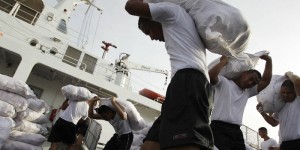Nations must give more aid, says Albay governor
Albay Gov. Joey Salceda on Sunday bemoaned the tepid response of the international donor community to the Philippines’ plea for aid for close to a million victims of super Typhoon “Pablo” (international name: Bopha), saying that countries whose huge greenhouse emissions caused climate change should bear a bigger responsibility for its victims.
Salceda, noting that the United Nations Office for the Coordination of Humanitarian Affairs (Unocha) had so far raised only $20 million (P820 million), or 21 percent, of the $65 million (P2.665 billion) it had sought for Pablo victims, said the government should demand more international aid considering that these typhoons were the result of climate change.
“Nothing can be more unjust—our country accounts for only 0.2 percent greenhouse gas emissions but ranks first in impact with Pablo being only a more recent example. The P36.95 billion in damage should principally be underwritten by countries that caused climate change.
Strongest to hit Mindanao
Pablo, a Category 5 typhoon packing winds of up to 260 kph, was the strongest tropical cyclone to ever hit Mindanao, an area that has rarely seen typhoons in the past.
“Right now, official development aid (some of which are regurgitated or recycled) will account for only 1.4 percent of the recovery budget for Pablo’s wrath. And if we adjust these ODA aggregates for their historically high overhead, the net benefit to climate change victims will even be smaller than the 1.4 percent,” said Salceda.
Salceda also cited lack of a central fundraising agency and weak coordination on the ground to explain why funding problems were hampering relief and rehabilitation work among victims of Pablo.
“The target $65 million is already very low and represents only seven percent of the P36.95 billion in damages. The ’very low 21 percent commitment level’ is a dismay. I don’t think it is donor fatigue since there is usually a high level of international support for climate-driven humanitarian problems,” said Salceda in an e-mail.
Lacking central institution
Salceda blamed the lack of a central institution tasked by the government to secure pledges for the 10 regions, 34 provinces, 318 towns and 40 cities affected.
He added that as a result of low coordination on the ground, there has also been relatively weak DANA or damage assessment and needs analysis and, as a consequence, the quality of the recovery plan or reconstruction program suffers.
In its report, Unocha said agencies involved in providing shelter for displaced families were facing challenges in pursuing their programs, specifically “severe funding constraints.”
Nearly one million people remain in need of food assistance while relief organizations grapple to provide shelter to thousands of residents a month after the powerful typhoon made landfall in northeastern Mindanao. So far, 1,067 persons were listed as having been killed and 834 remain missing.
Citing data from Philippine agencies, Unocha said the typhoon affected 6.2 million people, with 13,490 still in evacuation centers while close to one million were forced to stay outside temporary shelters.
Unocha reported that only 21 percent, or roughly a fifth of the UN’s initial appeal for $65 million in aid for Pablo victims, has been filled with $13 million in total international donations and up to $7 million in pledges.
“Between 800,000 and one million people are in need of food assistance in the worst affected areas,” said Unocha in the report.
Of this number, some 238,000 persons have received family food packs in the severely affected provinces of Compostela Valley, Davao Oriental, Surigao del Sur and Agusan del Sur, the UN agency said, citing data from the World Food Program and the Philippines’ Department of Social Welfare and Development.
Fund constraints
“Agencies report severe funding constraints and are unable to expand their programs,” said Unocha.
The accurate number of affected homes also “remain difficult to ascertain” given conflicting reports from the field, said the UN agency also said.
Unocha also cited the “unequal humanitarian response” to affected families in the Caraga region in northeastern Mindanao, which was earlier attributed to difficulties in distribution.
School feeding programs are set to be launched in public schools in severely hit areas through the Department of Education.
There is also a need to build and identify alternative displacement sites for families still living in public schools.
Displaced families face “poor living conditions, including congestion, lack of safe communal areas, lack of electricity and protection concerns,” Unocha noted. With a report from Tarra Quismundo















